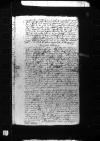Aus Ewer Erbarkeit ⌊⌋, / den XIX dits monts gebenn, / hab wir nicht sonder erschrecken vorstandenn, wie ⌊Ambrosius Feyrobent⌋ mit dem allerheiligsten leichnam unsers hern ⌊Ihesu Christi⌋ umbgangen und wie blasphemisch und lesterlich dar von gepredigt, / worin Ewer Erbarkeit cristlich / und wol hettenn gethon, / solchen teuflischenn menschen zuvorhalten / bis zu unsermm weiternn bericht. / Von welchenn Goth voracht wirt, / in den ist kein treu und gloubnn, / derwegen er nicht domit , sonder mit kettenn sold sein vorhafft wordenn. / Dieweil es das so gefarenn, / vorbittenn und behemmen wir bey Ewer Erbarkeit krafft ... briffs in der alt und newenn ⌊stat⌋ des gedochten lesterers alle schulde und gutter, wor die sein mugenn, / die selbten an unsernn zuloss nymants zu uberlossenn / und wold Got, das in, / dissen vorgessenenn an Goth menschen, Ewer Erbarkeit mochten zu wege brengen. / Wolt wir weiter anczeigen, / was zu thun etc. Ouch ⌊⌋ wir derwegen dem ⌊hern von Samlant⌋, / wolt an in dissen beygebunden briff lossenn gelangen etc. Dem bruder Augustino schicke wir hiemit uff VI monat ein commenda, / biss das wir uns weiter mit Ewer Erbarkeit mugen bereden, / die wir Gote in sein gnad befelenn. /
